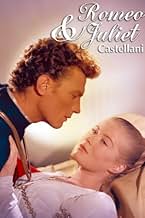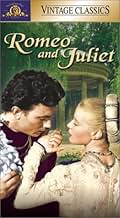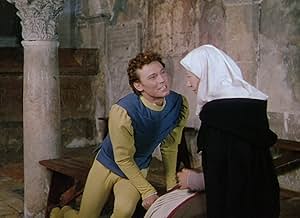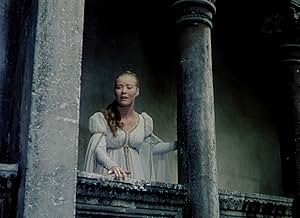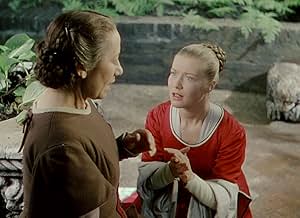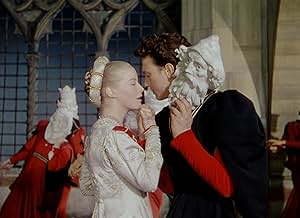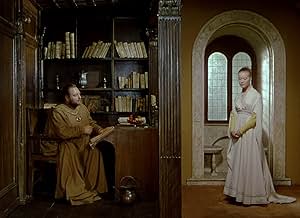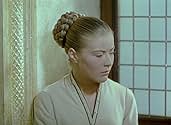In Shakespeare's classic play, the Montagues and Capulets, two families of Renaissance Italy, have hated each other for years, but the son of one family and the daughter of the other fall de... Read allIn Shakespeare's classic play, the Montagues and Capulets, two families of Renaissance Italy, have hated each other for years, but the son of one family and the daughter of the other fall desperately in love and secretly marry.In Shakespeare's classic play, the Montagues and Capulets, two families of Renaissance Italy, have hated each other for years, but the son of one family and the daughter of the other fall desperately in love and secretly marry.
- Director
- Writers
- Stars
- Nominated for 3 BAFTA Awards
- 6 wins & 6 nominations total
Ennio Flaiano
- Prince of Verona
- (as Giovanni Rota)
Thomas Nicholls
- Brother Giovanni
- (as Tom Nicholls)
- Director
- Writers
- All cast & crew
- Production, box office & more at IMDbPro
Featured reviews
This film version created by Renato Castellani is a beauty to behold.
In the picturesque settings of Siena, Padova, Verona and Venice, this romantic tale unfolds in glorious color.
While the character interpretations may appeal to a select number, I appreciate the total concept and the carrying out of that objective.
"Romeo" takes on a stylistic life of its own through Castellani, and for those willing to go on his journey, the rewards are great.
Mr. Harvey is interesting to see in an early role. As always, his work is very well thought out, and the aloofness which made him so right for callous young men in later modern roles, is intriguing here. Romeo now has a tinge of egotism and even femininity.
Well, why not? As there are dozens of ways to read a line, so there are many approaches to a character. There's nothing inherently sacrosanct in the role of Romeo, and Harvey interprets the way he (and Castellani) sees him, rather than according to some staid traditional model.
It's hard to believe this lovely production has not yet been transferred to video. Surely one day some enterprising company will take on this project and help preserve a very beautiful production for future generations to enjoy.
In the picturesque settings of Siena, Padova, Verona and Venice, this romantic tale unfolds in glorious color.
While the character interpretations may appeal to a select number, I appreciate the total concept and the carrying out of that objective.
"Romeo" takes on a stylistic life of its own through Castellani, and for those willing to go on his journey, the rewards are great.
Mr. Harvey is interesting to see in an early role. As always, his work is very well thought out, and the aloofness which made him so right for callous young men in later modern roles, is intriguing here. Romeo now has a tinge of egotism and even femininity.
Well, why not? As there are dozens of ways to read a line, so there are many approaches to a character. There's nothing inherently sacrosanct in the role of Romeo, and Harvey interprets the way he (and Castellani) sees him, rather than according to some staid traditional model.
It's hard to believe this lovely production has not yet been transferred to video. Surely one day some enterprising company will take on this project and help preserve a very beautiful production for future generations to enjoy.
Handsome, leisurely-paced, ineptly cut, often badly acted (especially by Laurence Harvey as Romeo, surprisingly) version of Shakespeare's most playful and youthful tragedy. Much of the film's charm lies in the creation of sumptuous tableaux in the tradition of Italian Renaissance painting, and the portrayal of Capulet is a marvelously acted stereotype of the fat, crude nouveau riche Italian patriarch; but Harvey (despite a few promising moments early on) is far too effusive and unctuous, creepily reminiscent of John Dall in Rope; Susan Shentall displays admirable coyness and gusto in the "overture" of the dance and courtship scenes, but stiffens and is stifled by the death of a thousand cuts toward the end (although almost nothing is cut from the first act). Still, aside from some ghastly, somnambulistic line readings, the film often dazzles with its feeling for the music of Shakespeare's text; the Nurse's folkloric shanty is highlighted with musical settings (shadings)-- Flora Robson is delightful in the role; the vaguely rappish banter of Benvolio and Romeo's first scene is gracefully and intelligently played. The presentation of the episode of losing the letter due to the Plague is a brilliant use of cinema to bring out embedded narrative in Shakespeare. The near-interchangeability of the actors who play Benvolio, Tybalt and Paris is regrettable.
This lavish British-Italian production about ill-fated and star-crossed lovers deals about the Montagues and Capulets, two feuding families whose young sons Romeo(Laurence Harvey) and Juliet (Susan Shentall) meet and fall in love and whose passion for one another is irresistible . But Juliet's father(Sebastian Cabot) wants marry her to a rich suitor (Norman Wooland) and keep apart Romeo.There are many obstacles on the way and they have to hide their love from the world because both know which their parents will not allow them to be together.The prince of Verona has prohibited duels and fights, but Tybaldo Capulet (Enzo Fiermonte) kills Mercutio and Romeo Montague as revenge murders Tybaldo. The priest friend (Mervyn Johns) prepares a potion for Juliet to simulate her death. Then Romeo is banished to Mantua when he receives the news that Juliet has dead, and happen their tragic destiny.
This is one of the best filmed and most pleasant adaptations of Shakespeare's play. Lush production and well-performed, though is handicapped because the two protagonists are too old for the roles , but at the play they were fifteen and fourteen years old respectively .This sumptuously version has the virtue of good and appealing casting , Laurence Harvey , Flora Robson , Mervyn Johns,Bill Travers and a brief introduction by John Gielgud. Exquisite cinematography by Robert Krasker, a cameraman usual of costumer and historical super-productions (Alexandre the Great , Cid , Fall of the Roman Empire) . Hauntingly wonderful musical score by Roman Vlad .The picture was professionally directed by Renato Castenalli, made in Pinewood Studios and Italian location . Anyone interested in tragic love tales and timeless stories will want to watch this cinematic version on Shakespeare tragedy.
Other versions about this know story are the following ones : the vintage classic, Romeo and Juliet (36)by George Cukor with Norma Shearer and Leslie Howard ; a dancing adaptation (1966) by Paul Czinner with Rudolf Nureyev and Margot Fonteyn ; famous rendition (1968) by Franco Zeffirelli with Leonard Whiting and Olivia Hussey ; and modern versión (1996) by Baz Luhrmann with Leonardo DiCaprio and Claire Danes .
This is one of the best filmed and most pleasant adaptations of Shakespeare's play. Lush production and well-performed, though is handicapped because the two protagonists are too old for the roles , but at the play they were fifteen and fourteen years old respectively .This sumptuously version has the virtue of good and appealing casting , Laurence Harvey , Flora Robson , Mervyn Johns,Bill Travers and a brief introduction by John Gielgud. Exquisite cinematography by Robert Krasker, a cameraman usual of costumer and historical super-productions (Alexandre the Great , Cid , Fall of the Roman Empire) . Hauntingly wonderful musical score by Roman Vlad .The picture was professionally directed by Renato Castenalli, made in Pinewood Studios and Italian location . Anyone interested in tragic love tales and timeless stories will want to watch this cinematic version on Shakespeare tragedy.
Other versions about this know story are the following ones : the vintage classic, Romeo and Juliet (36)by George Cukor with Norma Shearer and Leslie Howard ; a dancing adaptation (1966) by Paul Czinner with Rudolf Nureyev and Margot Fonteyn ; famous rendition (1968) by Franco Zeffirelli with Leonard Whiting and Olivia Hussey ; and modern versión (1996) by Baz Luhrmann with Leonardo DiCaprio and Claire Danes .
Yes, this film has been overpraised by Pauline Kael and others. For its time it was revolutionary, because no previous Shakespeare film had used so many outdoor, realistic locations. Unlike the previous MGM version (which all in all is superior), this version did not use middle-aged actors and made splendid use of technicolor. Black and white cinematography may suit MACBETH, HAMLET, KING LEAR, and other Shakespeare trajedies--but not this one. Since 1954, however, it has been remade in more cinematic and dynamic versions.
Nonetheless, it's a very worthwhile movie, especially for Shakespeare fans. I personally think Laurence Harvey is a terrific Romeo. Yes, he's a bit of a simp, but that's the character. In fact, Harvey is the screen's best Romeo; he's a lot more passionate than Leslie Howard in the MGM version, and he speaks the verse better than either DiCaprio or Leonard Whitting in the two subsequent versions. The locations, better than any version, remind us of just how thin the streets were in Verona during the time of the play, and the high, thick, stone walls serve as a symbol of the intransigence of the families.
Yes, it does have shortcomings, but don't dismiss its virtues, which are many, especially to those of us who want more than the MTV-type Shakespeare that the DiCaprio version offers.
Nonetheless, it's a very worthwhile movie, especially for Shakespeare fans. I personally think Laurence Harvey is a terrific Romeo. Yes, he's a bit of a simp, but that's the character. In fact, Harvey is the screen's best Romeo; he's a lot more passionate than Leslie Howard in the MGM version, and he speaks the verse better than either DiCaprio or Leonard Whitting in the two subsequent versions. The locations, better than any version, remind us of just how thin the streets were in Verona during the time of the play, and the high, thick, stone walls serve as a symbol of the intransigence of the families.
Yes, it does have shortcomings, but don't dismiss its virtues, which are many, especially to those of us who want more than the MTV-type Shakespeare that the DiCaprio version offers.
A friend of mine lent this film to me, because I'm doing research before directing the play. I've now seen about 9 different productions, and while the production is handsome and offers some interesting scenes to try and move the plot along, it features costumes woefully wrong for the period. The interpretation of the text is probably as good as it can be, but huge chunks of dialogue, including the Queen Mab Speech are cut, and Mercutio, always a vivid character, has been reduced to a few lines and an unimportant character. Sebastian Cabot is marvelous as Capulet, and Flora Robson offers some fine moments as the Nurse. Susan Shentall's Juliet is not bad, but except for occasional scenes, Laurence Harvey is phoning it in. I don't completely hate this one -- that would be the Baz Lurhmann disaster, but in comparison, while I've always loved the 1968 Zefferelli version, I'm seeing it from different eyes now, and as I watch the 1936 MGM production, I'm liking the interpretation of the text in that far better than the 1968. This film is an interesting artifact, but it's not especially inspirational. Enjoy it for what it's worth.
Did you know
- TriviaDame Joan Collins was originally slated to play Juliet, but turned it down when Writer and Director Renato Castellani insisted she undergo surgery to change the shape of her nose.
- ConnectionsReferenced in Arena: All the World's a Screen - Shakespeare on Film (2016)
- How long is Romeo and Juliet?Powered by Alexa
Details
- Release date
- Countries of origin
- Official site
- Languages
- Also known as
- Romeo & Juliet
- Filming locations
- Italy(made in Italy)
- Production companies
- See more company credits at IMDbPro
- Runtime2 hours 21 minutes
Contribute to this page
Suggest an edit or add missing content


